-
Genealogy & Names
-
Tourist Information
-
Culture & Reference
|
November 2023 
Red Hugh O'Donnell Image from Free Photos Of Ireland |


FREE WORLDWIDE DELIVERY FOR A LIMITED TIME find out more |

| Popular Articles from Recent Newsletters: |


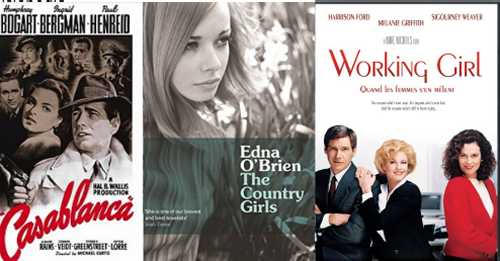 'The Committee on Evil Literature' was the rather ominous title ascribed by the Irish Free State to what would later become the Irish Censorship Board.
'The Committee on Evil Literature' was the rather ominous title ascribed by the Irish Free State to what would later become the Irish Censorship Board.
The extent of the influence of the Catholic Church in Irish affairs in the first half of the twentieth century is well documented and this mediaeval sounding body was yet another manifestation of that influence. It was the new Minister for Justice, Kevin O'Higgins, who in 1926 established the Committee with the aim of banning materials considered obscene or liable to corrupt public morals. Needless to say the Committee assumed the time-honored and proven methodology that has existed for Millenia in dealing with human affairs. Namely, it arranged a bunch of guys in a room to make up the rules. Three laymen and two clergymen examined the matter and decided that the laws of the country were insufficient to protect the population against the menace of intolerable written thoughts and that a Censorship Board should be established. Newspapers such as 'News of the World', the 'Daily Mail' and many female-orientated hotbeds of dissent including 'Woman's World' and 'Vogue' were all on their hit-list. All writings concerning the basic human necessity for birth-control were, of course, to be banned. The Censorship Board was thus established and continued to wreak havoc upon the creative and intelligent progress of the country for over half a century. The 1995 'Regulation of Information' Act relaxed parts of the censorship laws in an environment where their implementation had become far less intrusive. Thus it is with equal parts surprise and disdain that 2023 is to be listed as the year when the laws allowing for such severe censorship are finally to be repealled. Justice Minister Helen McEntee commented: 'I want to be clear that repeal will not impact on the prosecution of offences for possession or publication of child abuse material or for circulating threatening or abusive material. Rather, it is being done on the basis that there are other sufficiently robust statutory provisions in place to deal with these offences.' The current register of banned publications include nine books (dating from 1942 to 2016), and 264 Periodicals (dating from 1930 to 2003). Famous books banned in Ireland include 'Ulysses' by James Joyce, 'The Country Girls' by Edna O'Brien, 'The Dark' by John McGahern. Despicable movies that fell foul of the Irish censor included 'Casablanca', 'Dracula', 'Frankenstein' and amazingly 'Working Girl' from 1986 and 'WrestleMania 2000' from 2001. 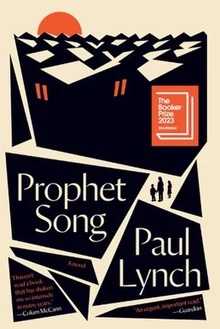 A novel that describes an authoritarian takeover in Ireland has won the 2023 Booker Prize for literature.
A novel that describes an authoritarian takeover in Ireland has won the 2023 Booker Prize for literature.
Dubliner Paul Lynch became the sixth Irish winner of the prestigious award, following in the footsteps of J. G. Farrell ('The Siege of Krishnapur', 1973), Iris Murdoch ('The Sea, The Sea', 1978), Roddy Doyle ('Paddy Clarke Ha Ha Ha', 1993), John Banville ('The Sea', 2005), and Anne Enright ('The Gathering', 2007). The author, who was born in Limerick and raised in Donegal, explained that his winning novel 'Prophet Song' is a study in grief, and tells the story of woman who has her husband taken away by a newly formed branch of the Irish police. He commented 'Well, you know, I think that if any of us were to look at the state of affairs from the point of view of 20 years ago, we couldn't quite believe the modern world that we find ourselves in. And I do think that you looked at things objectively, there is a sense of unravelling of a kind.' |

|
||||

|
note: Diarmuid, pronounced 'deer-mid' Gráinne, pronounced 'grawn-yeh' Fianna, prononced 'feena' Finn Mac Cumhaill, pronounced 'finn (or 'fyun') muh cool Oisín, pronounced 'ush-een' Long ago in Ireland, in the time of the Fianna, one of the greatest and most famous warriors under Finn mac Cumhaill's leadership was named Diarmuid O'Duibhne. 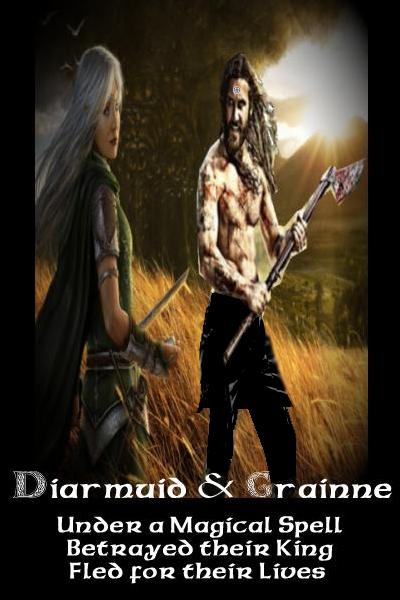
Diarmuid was the son of a man named Donn, and he was raised with his half-brother, the son of a man named Roc. One day, the son of Roc was frightened by an animal, and he ran between the legs of Diarmuid's father Donn to hide. Donn squeezed the child between his thighs until he died. When the child's father, Roc, found his son's broken body, he wept and raged. Frantically he performed a magical ceremony, and brought his son back to life in the body of a wild boar. He put a geasa on it to kill Donn's son Diarmuid, and sent the boar off into the wilds, because he knew that Diarmuid had a geasa on him never to pierce the skin of a pig, and would not be able to defend himself. Besides the wild boar's enmity, Diarmuid grew up to be a great warrior, and passed the rigorous tests to become one of the Fianna. The love and loyalty he had for Finn Mac Cumhaill was very strong, but Diarmuid was known for more than his fighting skills. He was a great favourite among women, being very beautiful, and he was born with the Bol Sherca in the middle of his forehead. This was a magical spot that made anyone who saw it fall in love with him. Diarmuid knew that this could cause all sorts of trouble, so he grew his hair down over his forehead to cover it, and tried to keep it out of sight. Finn Mac Cumhaill was getting on in years, but was still the greatest warrior in all Ireland. He held onto his place as the head of the Fianna, but he was aware that someday, the years would start to tell, even on him. Every year on his birthday, he undertook to leap across a great chasm, because he would rather die as soon as his strength began to fail him, than to live on and slowly decline. Finn loved all the finest things in life; feasting, storytelling, hunting and good company; and he decided that he had been too long without a wife. So he called his men together and asked for their advice on the matter. They all agreed that the only woman in Ireland fit to be the wife of the great Finn Mac Cumhaill was the daughter of the High King Cormac Mac Airt, called Gráinne. Now, Finn was aware that he was a good deal older than Gráinne, and he was shy of asking for her hand himself, so he sent two ambassadors to speak to Gráinne on his behalf. Gráinne was the most beautiful woman in Ireland at that time. When she was twelve years old, she had seen a boy playing hurling, and the wind had blown his hair back from his face, and she had fallen in love with him, completely and irrevocably. And as the years passed, she had refused every man who had ever asked for her hand, for love of the boy on the hurling field. But when she heard that the great Finn Mac Cumhaill was asking for her hand, she was flattered. She decided that she had spent long enough waiting for this boy, and she did not know his name or where to find him, so she decided to marry Fionn. When her answer was given, a great feast was held to celebrate the upcoming wedding. Gráinne hid behind a curtain, to spy out and catch a glimpse of her husband-to-be. She Finn's son Oisín sitting beside him, and was struck by the contrast between them: how much younger and more beautiful Oisín looked than his father. She wondered why Finn had asked for her for himself, and not for his son, and she began to regret her decision. And then Finn moved out of the way, and she saw the man seated on the other side of him: Diarmuid O'Duibhne. The boy from the hurling field who she had loved since she was twelve. At that moment, Gráinne resolved that she was not going to marry Finn Mac Cumhaill. She sat down to the feast, saying nothing, and passed around a cup of wine, into which she'd put a sleeping posset. She gave it to Finn, and to all of the Fianna, apart from the leaders of the Fianna. Then, one by one, she asked each of the leaders of the Fianna if they would run away with her. They all refused, such was their loyalty to Finn. Then Gráinne turned to Diarmuid and put him under a geasa to run away with her. Diarmuid was torn. He had never betrayed Finn, and never wanted to, but he could not go against a geasa put on him by a woman. She told him that she was going to ready herself, and went to her chambers, and while she was gone, Diarmuid consulted with the other leaders of the Fianna. They all agreed: he had no choice. Even though it meant tearing his heart in two, and leaving one half of it with Finn Mac Cumhaill, he could not break a geasa. Very unhappily, Diarmuid went away with Gráinne. Unused to hard travelling, Gráinne grew weary after a while and asked Diarmuid to carry her, but he refused, hoping she would give up and go back to Finn. Instead, she put him under a geasa to go and find horses for them, and he had no choice but to do as she asked. They met with Aengus Óg, the god of love, who thoroughly approved of their match, and decided to help them. He told them that they were never going to be able to sleep in a cave with one opening, or a house with one door, or a tree with one branch, and that they would never be able to eat where they cooked, or sleep where they ate. They would have to keep moving if they were to stay ahead of Finn and the Fianna. When Finn Mac Cumhaill awoke the next day from the sleeping potion, and realized what had happened, his heart broke. It was not Gráinne's desertion that hurt him, but the fact that Diarmuid had betrayed him. He set out with a grimness and a set in his jaw to catch them up and get his revenge. For a long time he chased them, and they were always one step ahead. Every time he came across their traces, he grew more and more furious, but every time he found one of the nests that Diarmuid had made for Gráinne, he found that Diarmuid had left a piece of raw meat or fish as a message to Finn that he had not touched Gráinne. Then one day, as Diarmuid and Gráinne were crossing a ford, a splash of water wet her thigh. She said to Diarmuid that whatever courage he might have in battle, that splash of water had more courage than he. And Diarmuid was shamed into making her his wife, and after that he left no messages of purity for Finn. One night, they slept in a house with seven doors, and Finn and the Fianna caught up with them. A member of the Fianna stood at each door to make sure they couldn't escape. Aengus Óg came down, and told them that he would spirit them away to safety, but Diarmuid refused. He sent Gráinne away with the god, and stayed behind. Diarmuid went to each door in turn, and at each door, the man who guarded it offered to let him go, till he came to the seventh door, guarded by Finn Mac Cumhaill. Roaring in anger, Finn told him he would kill him if he came out that door. Diarmuid opened the door to face him, and took to the fight. When the Fianna surrounded him, he leaped up with the leap of a salmon, jumped over their heads, and ran away to join Gráinne. Later that year, Diarmuid got permission from a giant to hunt on his land, provided he did not eat any of the magical rowan berries that grew on the tree where the giant lived. But Gráinne, who was pregnant, longed for the berries, and so Diarmuid killed the giant for her. The berries high up in the tree were sweeter than those below, so the two climbed up into the tree to the giant's bed, and ate berries and rested a while. The Mac Morna clan, enemies of Finn Mac Cumhaill, came to make peace with him. Finn said that he would agree to a truce if they brought him either the head of Diarmuid O'Duibhne, or the magical berries of the rowan tree. They decided the berries would be easier to get, so they set out, but of course, they found the giant slain and many of the berries missing. Finn knew that only Diarmuid could have killed that giant, since it wasn't one of his men, and he and the Fianna spent that night camping under the tree. Finn had a good idea that Diarmuid was still up there. He challenged Oisín to a game of chess, and as Oisín began to make a move that would lead to Finn beating him, a berry dropped onto the square that he should move to. He made the move, and continued to follow the guidance of the rowan berries. Eventually, Oisín beat his father at chess for the very first time. Finn Mac Cumhaill sprang up, saying “There's only one man in Ireland who could have beaten me at chess, and that's Diarmuid O'Duibhne.” And there was Diarmuid, looking down on them from up in the tree. Diarmuid leaped to safety, while Aengus Óg spirited Gráinne away. After years and years on the run, and all the time Diarmuid and Gráinne had spent living together as man and wife, raising their four sons and their daughter, and never able to stop or rest, they decided to try and make peace with Finn Mac Cumhaill. Finn agreed to put his anger aside, and welcomed them back with a great feast. They were finally able to settle down with their family and live in peace, and Diarmuid and Finn rebuilt their great friendship. Some years later, Finn asked Diarmuid to go hunting with him. They came across a terrible beast: the wild boar of Ben Bulben. They tracked it through the wilds, and when they cornered it at last, the boar ran straight for Diarmuid. It was the son of Roc, who had been killed so many years before, and it had to fulfil the geasa to kill the son of Donn. Finn saw the beast charging at him, and reminded Diarmuid of his geasa, to never pierce the skin of a pig. The boar gored Diarmuid, and Diarmuid hit it on the head with the hilt of his sword, killing it. But it was too late, and Diarmuid lay dying. He asked Finn Mac Cumhaill to give him a drink of water from his hands. Anyone who drank water from the hands of Finn Mac Cumhaill would be restored to health, because of his magical thumb. So Finn went to the river, and carried water back to Diarmuid, but at the last moment, he remembered with bitterness, how Diarmuid had run away with Gráinne, and he let the water trickle out between his fingers. But he saw Diarmuid didn't have long, and the great friendship between them moved his heart, so he went back for water, only to let it trickle through his fingers a second time. The third time he went back for water, and there was no bitterness left in him. He poured the water in between Diarmuid's lips, but it was too late. Diarmuid O'Duibhne was already dead. Read more amazing Stories of Irish Legends and Mythology. |


find out more |

|
Hugh O'Donnell was born around 1572 in County Donegal. His parents were Hugh O'Donnell, Lord of Tir Chonaill and Ineen Dubh (Finola MacDonald, the Dark Daughter of MacDonnell of the Isles). However, he was fostered out to various noble houses in Ulster. Red Hugh was destined for fame and became a notorious nemesis to the English. 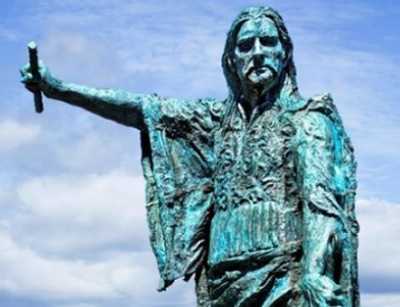 Even at the age of fourteen, Red Hugh had a reputation, and this renown came to the attention of Lord Deputy Sir John Perrot. This English Lord was an illegitimate son of Henry VIII. Perot was a ruthless and conniving man, bent on subduing Ireland for England's Queen Elizabeth I. Perrot reasoned that if the O'Donnells combined with the powerful O'Neills, they would be a threat to England. Hence, he wanted Red Hugh removed from the political chessboard.
Even at the age of fourteen, Red Hugh had a reputation, and this renown came to the attention of Lord Deputy Sir John Perrot. This English Lord was an illegitimate son of Henry VIII. Perot was a ruthless and conniving man, bent on subduing Ireland for England's Queen Elizabeth I. Perrot reasoned that if the O'Donnells combined with the powerful O'Neills, they would be a threat to England. Hence, he wanted Red Hugh removed from the political chessboard.
When Red Hugh was fostered by MacSwiney, Lord of Fanat, at around 14 years of age, a merchant ship sailed into Loch Swilly and anchored at MacSwiney's castle. The captain invited MacSwiney, his attendants and others to come on board and taste some rare wine. MacSwiney, along with Red Hugh and others, went onboard but were captured. MacSwiney and others were released and given hostages, but not Red Hugh. Red Hugh would be imprisoned in the Birmingham Tower of Dublin Castle. There was much anger throughout Ireland over this deceitful act, especially in Tir Chonaill. His mother desperately tried to obtain his release but was unsuccessful. In December 1590, Red Hugh attempted to escape. Unfortunately, his efforts failed. In December/January 1592, he tried again and made it. A friend had smuggled a file in. From Christmas Eve of 1591, With the Christmas festivities taking place, Red Hugh freed himself. He then freed his fellow prisoners, Henry and Art O'Neill. They tied the hangings of a bed to make a rope and descended from their prison. Next, they swam the castle's icy moat. They were to meet a horse-boy, a friend, but the horses had been taken away. He did, however, provide stout shoes for their escape. 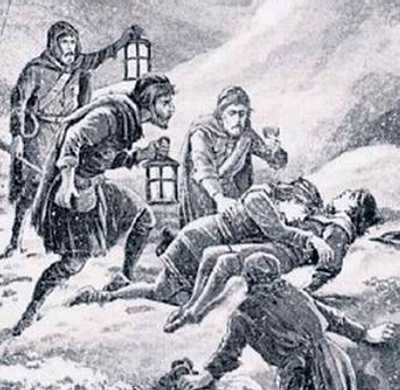
Their guide led them to the outer rampart, yet Henry had fallen behind. Unable to go back, Red Hugh and Art escaped into the countryside. Art ran out of energy and slowed down, yet Hugh stayed with him. It was agreed that the horse-boy attempt to go and get help from Feach O'Byrne while Red Hugh stay with the exhausted Art; in fact, both were tired. They had no food and left their cloaks behind at the moat. The winter was freezing, and their bodies were covered in snow. Feach's men eventually found them, sadly, Art had died, but Red Hugh came to. The soldiers made a litter and carried Red Hugh to the House of Feach. The news spread anger and embarrassment from Red Hugh's former captors and joy throughout Ireland. Red Hugh recovered and made an alliance with Hugh O'Neill of Tir-Owen. They ignored past clan feuds and stood united against the common threat of the English. O'Neill sent Red Hugh to Hugh Maguire, Lord of Fermanagh, for a further alliance. In the meantime, Donegal Castle was besieged and stoutly defended by Ineen Dubh. However, Red Hugh and his men came to the rescue, repelled the enemy, and saved the castle and his mother. Then, on 3 May 1592, Red Hugh was proclaimed Chieftain O'Domhnaill (O'Donnell) at the rock of Doone, the clan's timeworn throne, at Kilmacrennan, County Donegal, in place of his ageing and tired father. Part of Red Hugh's ceremony was to turn three times from left to right, then again, from right to left to not only view the extent of his lands but to honour the Holy Trinity. Now commenced the Nine Years' War (1593–1603) based on Irish independence with Red Hugh and Hugh O'Neill battling the dominance of Elizabeth I. Spain, being a Catholic country, was sought out as an ally. Even so, some Irish fought alongside the English, This could be explained as gaining favours from Elizabeth to aid in ancient clan rivalry, or conceivably certain clan chiefs may not have realised that England wanted complete control of Ireland. At one stage, O'Neill was considered an ally to England. However, he broke off negotiations with Elizabeth, cast off his title of Earl and instead was declared 'the O'Neill'. Ireland found an ally in Spain too. Between 1595 and 1597, Red Hugh had taken control of Connaught, including Sligo. The English were retreating, and Red Hugh extended his dominance to Leitrim. In 1599, Red Hugh ambushed the forces of Sir Conyers Clifford in the Curlew Mountains, whereby the English were soundly defeated. In 1601, the Spanish arrived at Kinsale to help the Irish. Red Hugh and his men made an incredible forced march of 40 miles to meet them and O'Neill. Red Hugh and the Spanish commander, Juan del Aquila, wanted to attack the English immediately. Unfortunately, O'Neill was over cautious. The Battle of Kinsale took place in December 1601, and the English, led by Lord Mountjoy, were victorious. The Irish troops were forced to retreat. Red Hugh sailed for Spain in an effort to convince their king for aid, but fell ill and died of a fever. He is buried with princely honours in the Cathedral of St. Francis at Valladolid. However, centuries later, it was discovered that an English State paper was sent to Spain to poison Red Hugh; it was authorised by Lord Mountjoy. Red Hugh was, at such a young age, a remarkable and courageous warrior who made the English generals tremble and despise him for his daring successes. He died an Irish hero. |


find out more |

|
It was a couple of weeks now since Barney had used a tractor to pull a dead calf from his cow. In the process, she seemed to have sustained a bilateral obturator paralysis. Her obturator nerve on one or both sides having been pinched long and hard by the passage of the foetus through her bony pelvis, she had been down and unable to rise since the day of her calving. I'd tried, injecting dexamethasone epidurally and hoped it may have helped improve her pain and discomfort, but days and then weeks passed, and she showed no improvement. 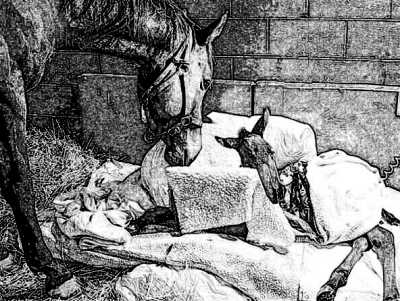 Barney, whose arthritis and vision were both dreadful, was evidently failing to turn her from hip to hip and to nurse her adequately for more than a week now, and I'd been begging him to let me euthanize his cow.
Barney, whose arthritis and vision were both dreadful, was evidently failing to turn her from hip to hip and to nurse her adequately for more than a week now, and I'd been begging him to let me euthanize his cow.
Late this evening he finally calls me up and agrees. His farm is in Gortnasillagh, on the south side of the incomparably gorgeous Gweebarra estuary,and just a few miles south of our house at Cloughwally, at the tip of Traighena Bay. It’s about 8:30 p.m. and just getting dark when I arrived at Barney's. The cow was sitting out in the yard in front of his cow byres. As I pulled my needle from her jugular vein, I was satisfied to see her finally slip out of her misery (presumably) and go wherever all good old cows go (presumably). No breath. No heartbeat. No reaction to a finger on her cornea. I'd read that one should wait a full four minutes without any corneal response before certifying death but, hey, (1) I wasn’t about to certify death, whatever that may (or may not) be, and (2) it was fast getting late and I had calls down south waiting for me. Barney begged me to finally send him the entire bill - for the entire, hopeless case. Yeah. I told him thank you, bade him goodbye, and headed south to those cases around Ardara and Kilcar. My last case was an urgent one, to Paddy McGill’s, near Meenaneary. One of Paddy's beautiful Clydesdale mares had foaled some ten days before, and the foal, never too strong, had stopped suckling altogether, then went off her feet, and was now very rapidly going downhill. By the time I arrived, the creature was in a state of collapse, and I could not say how her problems had started. Having set up an i-v drip, warmed her up, and given her antibiotics, anti-inflammatories and vitamins, we managed to milk Mom, and tube feed Baby. In all, I was there for more than an hour, during which time my patient showed no improvement, but continued to deteriorate, if anything. As I said goodbye to Paddy, I asked him to please let me know, first thing in the morning, whether the foal was still living or not. 'But, Tom, I would not want to be waking you up if the crathur has passed on, you know: I know you need all the sleep you can get this time of year, an' all, and you said you wouldn’t give much for her chances...' 'No, no, Paddy, please don’t you worry about that. I’ll be wondering until I hear from you, and needing to plan out my day, and which direction I should go in, first, anyway, but thank you!' It's past 3:30 a.m. when I get to bed, but sleep, as usual, comes instantly... until the bedside phone rings at 6:50 a.m. 'Hello. Is that you, Tom? This is Paddy here, Paddy McGill. Sorry to waken you, but, you know that foal you were with last night?' Yes, I knew, alright. And, along with the apology and the sadness in Paddy's voice, somehow, there was something unmistakably tres-passe about the way he said those words 'that foal you were with last night'. 'Naw, she was gone when I came out this morning. Well, I'm terrible sorry, Tom. I mean for you, Tom, for I know ye done all ye could for her.' 'I am terribly sorry, Paddy. That's a huge blow, I know, when you'd been so delighted to finally get that mare in-foal and everything...' 'Well, thanks you for all you done, Tom, and please be sure and send me your bill, won't you?' 'Thanks, yourself, for calling, Paddy, and for all the help last night. So sorry we couldn't save her.' I try to snatch a few more minutes sleep, but of course keep wondering what else I ought to have done for the foal, and why I hadn't got there sooner. Frigggggg! Then the phone goes again. It's 7:10 a.m. The number showing up is familiar: Ominously familiar. Too familiar! Oh, NOOOOOOH! 'Hello! Hello! Is that you, Tom?' The voice is familiar, too - all too familiar and way, way too excited. 'Yes, Barney, that is you, isn't it?' 'Tom, Tom, Tom, you know that cow you were with last night?' |

|
The history of Morty Sullivan ought to be a warning to all young men to stay at home, and to live decently and soberly if they can, and not to go roving about the world. 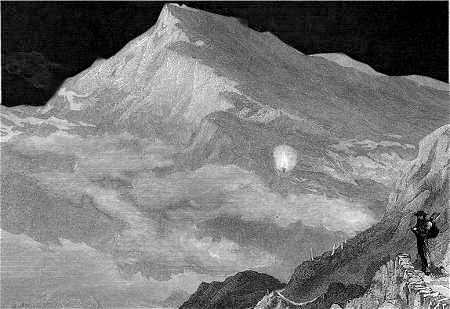 Thirty years after the old couple had been laid peacefully in their graves, there came a stranger to Beerhaven enquiring after them - it was their son Morty; and, to speak the truth of him, his heart did seem full of sorrow when he heard that his parents were dead and gone, but what else could he expect to hear? Repentance generally comes when it is too late.
Thirty years after the old couple had been laid peacefully in their graves, there came a stranger to Beerhaven enquiring after them - it was their son Morty; and, to speak the truth of him, his heart did seem full of sorrow when he heard that his parents were dead and gone, but what else could he expect to hear? Repentance generally comes when it is too late.
Morty Sullivan, however, as an atonement for his sins, was recommended to perform a pilgrimage to the blessed chapel of Saint Gobnate, which is in a wild place called Ballyvourney. This he readily undertook, and willing to lose no time, commenced his journey the same afternoon. He had not proceeded many miles before the evening came on. There was no moon, and the starlight was obscured by a thick fog, which ascended from the valleys. His way was through a mountainous country, with many cross-paths and by-ways, so that it was difficult for a stranger like Morty to travel without a guide. He was anxious to reach his destination, and exerted himself to do so; but the fog grew thicker and thicker, and at last he became doubtful if the track he was in led to the blessed chapel of Saint Gobnate. But seeing a light which he imagined not to be far off, he went towards it, and when he thought himself close to it the light suddenly seemed at a great distance, twinkling dimly through the fog. Though Morty felt some surprise at this he was not disheartened, for he thought that it was a light sent by the holy Saint Gobnate to guide his feet through the mountains to her chapel. And thus did he travel for many a mile, continually, as he believed, approaching the light, which would suddenly start off to a great distance. At length he came so close as to perceive that the light came from a fire, seated beside which be plainly saw an old woman, then, indeed, his faith was a little shaken, and much did he wonder that both the fire and the old woman should travel before him, so many weary miles, and over such uneven roads. 'In the holy names of the pious Gobnate, and of her preceptor Saint Abban', said Morty, 'how that burning fire move on so fast before me, who can that old woman be sitting beside the moving fire?' These words had no sooner passed Morty's lips than he found himself, without taking another step, close to this wonderful fire, beside which the old woman was sitting munching her supper. With every wag of the old woman's jaw her eyes would roll fiercely upon Morty, as if she was angry at being disturbed; and he saw with more astonishment than ever that her eyes were neither black, nor blue, nor gray, nor hazel, like the human eye, but of a wild red colour, like the eye of a ferret. If before he wondered at the fire, much greater was his wonder at the old woman's' appearance, and stout-hearted as he was, he could not but look upon her with fear, judging, and judging rightly, that it was for no good purpose her supping in so unfrequented a place, and at so late an hour, for it was near midnight. She said not one word, but munched and munched away, while Morty looked at her in silence. 'What's your name' at last demanded the old hag, a sulphurous puff coming out of her mouth, her nostrils distending, and her eyes growing redder than ever, when she had finished her question. Plucking up all his courage, 'Morty Sullivan', replied he, 'at your service'meaning the latter words only in civility. 'Ubbubbo!' said the old woman, 'we'll soon see that' and the red fire of her eyes turned into a pale green colour. Bold and fearless as Morty was, yet much did he tremble at hearing this dreadful exclamation. He would have fallen down on his knees and prayed to Saint Gobnate, or any other saint, for he was not particular, but he was so petrified with horror, that he could not move in the slightest way, much less go down on his knees. 'Take hold of my hand, Morty', said the old woman, 'I'll give you a horse to ride that will soon carry you to your journey's end.' So saying, she led the way, the fire going before them, it is beyond mortal knowledge to say how, but on it went, shooting out bright tongues of flame, and flickering fiercely. Presently they came to a natural cavern in the side of the mountain, and the old hag called aloud in a most discordant voice for her horse! In a moment a jet-black steed started from its gloomy stable, the rocky floor whereof rung with a sepulchral echo to the clanging hoofs. 'Mount, Morty, mount!', cried she, seizing him with supernatural strength, and forcing him upon the back of the horse. Morty finding human power of no avail, muttered, 'O that I had spurs!' and tried to grasp the horse's mane, but he caught at a shadow. It nevertheless bore him up and bounded forward with him, now springing down a fearful precipice, now clearing the rugged bed of a torrent, and rushing like the dark midnight storm' through the mountains. The following morning Morty Sullivan was discovered by some pilgrims (who came that way after taking their rounds at Gougane Barra) lying on the flat of his back, under a steep cliff, down which he had been flung by the Phooka. Morty was severely bruised by the fall, and he is said to have sworn on the spot, by the hand of O'Sullivan, and that is no small oath: 'Nulla manus, Tam liberalis, Atque generalis, Atque universalis, Quam Suilivanis.', never again to take a full quart bottle of whisky with him on a pilgrimage. |

View the Archive of Irish Phrases here: http://www.ireland-information.com/irishphrases.htm |

|
The winner was: Tiredmomof7@aol.com who will receive the following: A Single Family Crest Parchment (usually US$29.99) Send us an email to claim your Parchment, and well done! Remember that all subscribers to this newsletter are automatically entered into the competition every time. I hope that you have enjoyed this issue! 
by Michael Green, Editor, The Information about Ireland Site. https://www.ireland-information.com Contact us (C) Copyright - The Information about Ireland Site, 2023. 17 Páirc Ghrainbhil, Carraig Dubh, Contae Baile Átha Cliath, Ireland Tel: 353 1 2893860 |

|
MARVELOUS GIFTS FOR ANY OCCASION FREE DELIVERY TO YOUR DOOR 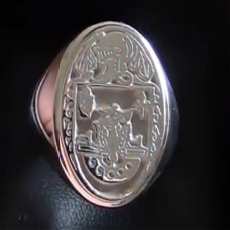
BIG REDUCTIONS! Stunning Family Crest Signet and Seal Rings 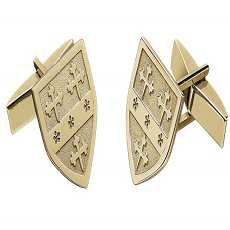
DISCOUNTED FOR A LIMITED TIME Elegant Cufflinks 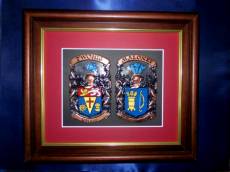
Incredible Family Crest Plaques Made in Ireland 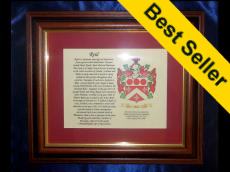
Superior Framed Family Crest Parchments 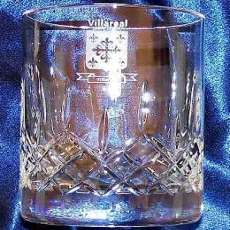
Gorgeous Glistening Galway Crystal 'Your-Name' Old Irish Sign NEW DESIGNS! 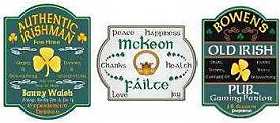
From US$34.99 - Free Delivery 
New Designs available on our Coffee Mugs 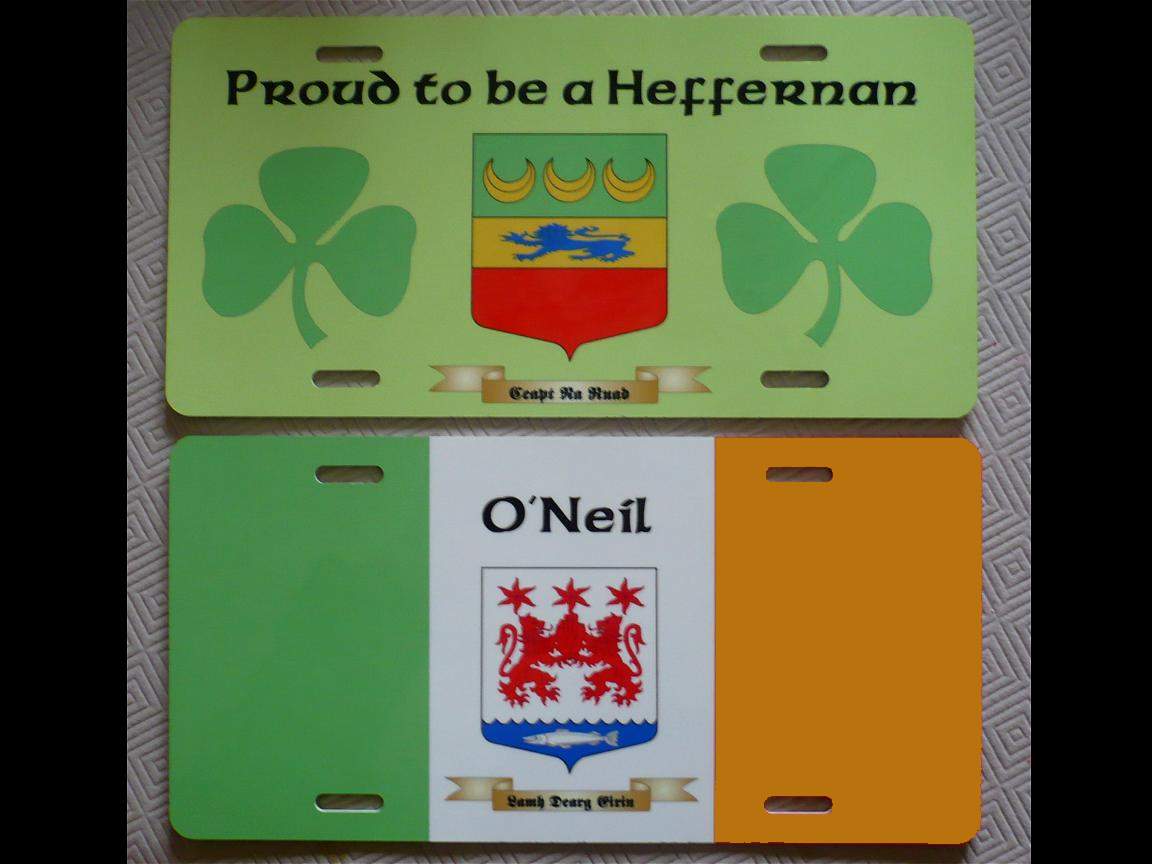
Personalized Licence Plate 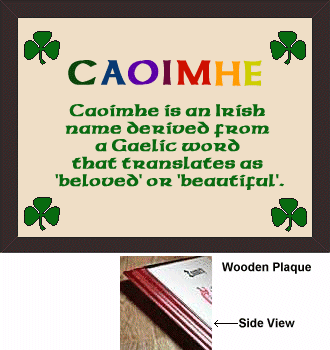
Personalized First Name Plaque. Great for Kids! 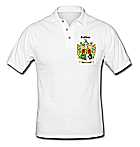
'Your-Name' Polo & Tee Shirts 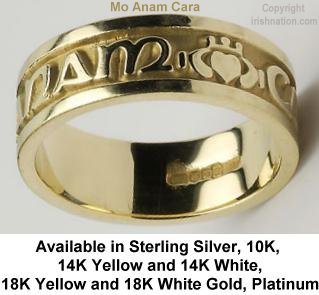
From US$69 Delivered BIG REDUCTIONS! Stunning Engraved Rings from Ireland with Irish Language Phrases. Mo Anam Cara: My Soul Mate Gra Dilseacht Cairdeas: Love, Loyalty, Friendship Gra Go Deo: Love Forever Gra Geal Mo Chroi: Bright Love of my Heart SEE MORE GREAT OFFERS AND DISCOUNTS AT: IRISHNATION.COM FREE DELIVERY FOR A LIMITED TIME! |
